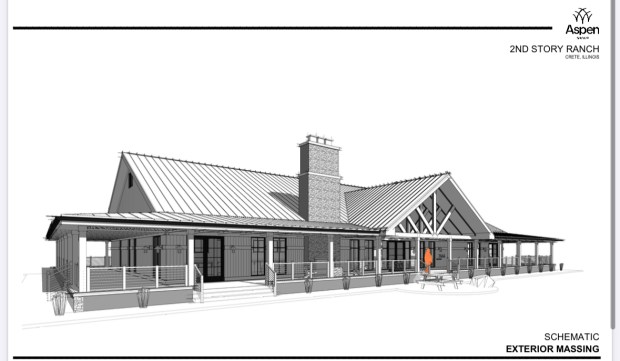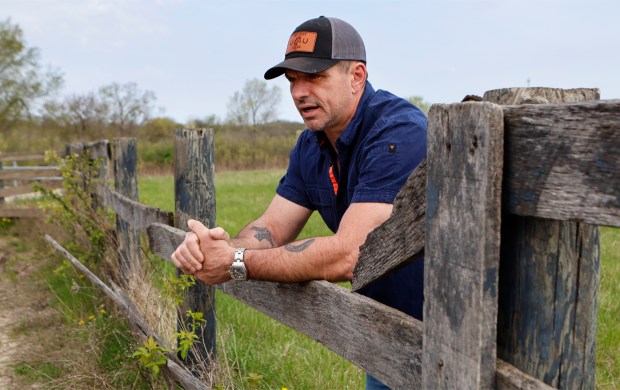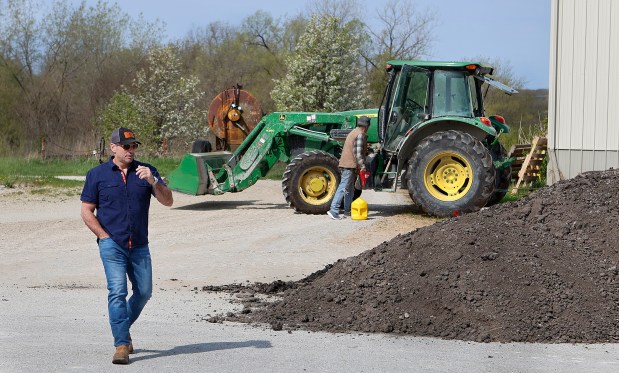At the end of 2023, after having successfully rehabbed two south west suburban homes into substance use disorder recovery centers through his nonprofit Second Story Foundation, Jim O’Connor said he faced questions of whether he sought to build a facility from scratch.
“I said, ‘get me a horse farm and I’ll think about it,’” O’Connor recalled.
He just did that March 13, raising $1 million in private donations to acquire a 68-acre harness racing training and horse boarding facility on the corner of East Bemes Road and South Klemme Road in unincorporated Crete.
O’Connor was hard at work Monday at the property, where cart-carrying horses could be seen trotting down a gravel road toward an 85-stall barn.
“I’m here four days a week, and actually working on the site probably 20 hours a week,” O’Connor said.
O’Connor hails from Evanston, but said he fell in love with the south suburbs after entering alcohol abuse recovery in 2016.
It took him losing his relationships — his family, friends and employer — to admit he was an alcoholic, O’Connor said. But once he did, he entered a 28-day, in-patient program in Hazel Crest that eventually led him to the horse farm that inspired him to buy the 2400 East Bemes property.
He said he plans to flip the farm into a picturesque recovery center where up to 14 men can live and work for as long as they need.
“The work-based program was transformational,” O’Connor said. “The amount of love that I’ve gotten from people in the recovery community … There’s a lot of healthy people with not just lives of dedicated recovery, but full lives based around having made a change in their life.”
On the day the ranch opens and whenever newcomers join the program, selected participants will immediately be told, “welcome home, we love you,” O’Connor said.
But before that can happen, O’Connor needs to raise funds to build the 7,000-square-foot lodge designed by the Frankfort-based Aspen Group, where residents will stay while they work toward financial, social and physiological independence.
O’Connor envisions the lodge with a large commercial kitchen where his wife, Francie Byrne, will cook and serve two meals a day to residents, as well as a wraparound porch useful for group activities and individual counseling sessions.
O’Connor, Byrne and a few other program leaders will live on the ranch in two staff homes. There are no houses for humans on the property, so these structures will be new.

O’Connor is also looking to state, county and community block grants for the $3.5 million required to get the program on its feet.
“Money drives the timeline,” O’Connor said. “If the grants line up, we could be building next fall to open this time next year. If the money takes longer, then it takes longer, but we’re pretty much shovel ready.”
The Second Story Foundation recently received $88,000 from the Will County Community Mental Health Board toward a community service partnership with the Recovery Community Center of Joliet. It will allow people within Will County Problem Solving Courts satisfy community service requirements by working on the ranch. The service event is scheduled from 8 a.m. to 3 p.m. on May 8 and will include a barbecue lunch and live country music.
O’Connor said the foundation has begun the property zoning process through Will County and is grateful for bipartisan support for the ranch’s development.
Unlike many other rehabilitation facilities that accept insurance and out of pocket payments, Second Story Ranch treatment will be free of cost to those who qualify. O’Connor said the program application process involves extensive background checks and interviews to determine its best candidates.
“When you live a life of severe substance use disorder, getting caught up in the legal system and breaking the law is kind of part of it,” O’Connor said. “We just want to know what the story is.”
Those with long histories of violent crime will not qualify for the program, O’Connor said.

Residents are expected to work on the farm for six to 10 months, the typical phase before they are ready to seek jobs outside the ranch. O’Connor and other program staff will provide connections and support as they transition to a job, and eventually residence, in the broader community.
“In the first phase of the program, we’re just working on healing, making human connections, repairing spiritually and building the work ethic,” O’Connor said. “Once you’re working on the outside in phase 2 of our program, now we’re working on financial planning, building credit scores back.”
“We’re also working on the work life stressors that come from having to enter the workforce where maybe not all the employers or colleagues you work with are as compassionate to your journey as we might be,” he said. “It’s our job to be strong enough to know how to handle it.”
Joey Mayer knows firsthand the value of getting to developing financial independence while maintaining a recovery focused community.
The 27-year-old said he’s been sober just over two years and met O’Connor while a participant at the Pathway to Sobriety program at The Center, a Palos Park’s religious nonprofit organization. O’Connor also found sobriety at The Center and came back to direct the program before launching the foundation.
Mayer recently moved from the Second Story Foundation’s transitional home in Orland Hills to the Alsip location, where he lives with three other men in alcohol abuse recovery. While living there, Mayer works at the 9 Acres Equestrian Center stables while receiving free case management, financial planning and counseling.
“This is my first time ever having my name on a lease,” Mayer said Tuesday. “This is like a new stepping stone for me to get adapted and acclimated to life down the road when I go to get my own home.”
Mayer said he supports the ranch model of recovery, which he believes will help others escape the isolation and dependence that is commonly developed in emergency rehab programs.
“A guy who leaves rehab and doesn’t follow up on programs goes back to the same environment where he was, whether that’s a basement or his room,” Mayer said. “So I think the job and responsibility straight out of rehab is very helpful … And not only that, it gives them that breath of fresh air.”
ostevens@chicagotribune.com




